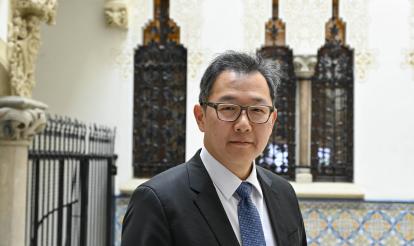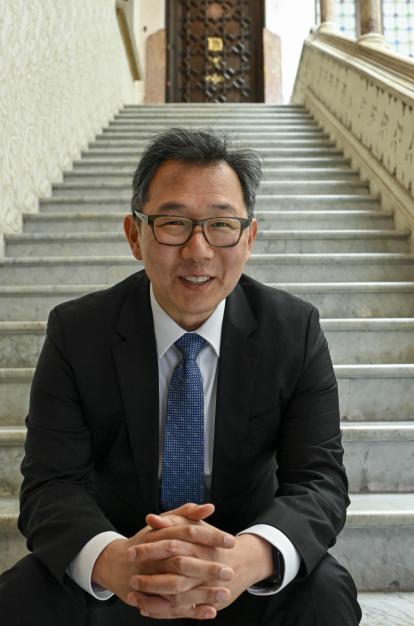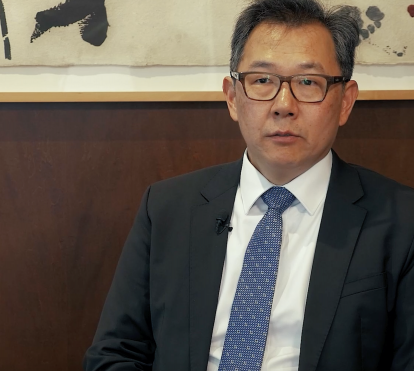
You are reading:

You are reading:

12.06.25
5 minutes readThe United Nations Economic and Social Council (ECOSOC) serves as a key bridge between the UN, NGOs and philanthropic organisations. Wook-Jin Chang, Director of Non-Governmental Organisations at ECOSOC,defends the need to expand the representation of associations from the Global South and calls for closer cooperation with European philanthropic organisations such as the ”la Caixa” Foundation to jointly address major global challenges.
Yes, absolutely. As an intergovernmental organisation founded 80 years ago, the UN continues to address numerous challenges through collaborative processes among its Member States. However, nowadays, many global issues cannot be tackled by governments or the UN alone. We need the full participation of civil society, the private sector, academia and, in particular, NGOs.
The Sustainable Development Goals (SDGs) were unanimously agreed upon in 2015 and have a much broader and deeper scope than the Millennium Development Goals, which were adopted in 2000. They not only address issues such as poverty, education and certain transnational diseases, but also tackle global challenges like climate change, sustainable cities and the economic development of the UN’s 193 Member States.
There are only five years left until 2030 and, unfortunately, due to COVID-19, numerous global conflicts and the economic recession, the 17 SDGs are still far from being achieved. Therefore, if we are to make progress towards these goals, we need much stronger support from local, regional and international NGOs.

When the UN was founded in 1945, its founding fathers already envisaged the participation of NGOs in the forum. Article 71 of the UN Charter grants ECOSOC the authority to engage with NGOs in order to gather expert information and their unique perspectives on global issues. At that time, only 40 NGOs were accredited. Today, there are over 6,000, and we receive nearly 1,000 new applications each year.
ECOSOC serves as the gateway to events such as the 4th International Conference on Financing for Development, which will take place at the end of June in Seville. In these gatherings, NGOs and philanthropic organisations have the opportunity to share the views of their constituencies and local communities, helping government officials, diplomats and UN staff gain a clearer understanding of what is happening on the ground.
As I mentioned, we have over 6,000 accredited NGOs, but that’s not enough. In Spain, for example, there are more than 15,000 registered foundations, yet only a few – 80, to be precise – are actively involved in the work of the UN. The same is true in many other countries. If we consider the total number of NGOs worldwide, 6,000 represents only a small portion of the overall picture. My priority, therefore, is to ensure that more NGOs are aware of the benefits of becoming members of ECOSOC and how best to promote their work in collaboration with the UN, as well as with other NGO networks.
We have 193 Member States, but more than two-thirds of the 6,500 accredited NGOs come from just the UN’s top 20 countries, that is, only 10% of the Member States. The United States has by far the largest number of accredited and active NGOs. Spain ranks 15th on the list. Many other countries have much lower representation from their civil society. Latin America and the Caribbean, for instance, have 33 Member States, yet only 6% of ECOSOC-accredited NGOs come from this group.
The degree of progress towards achieving the SDGs varies from country to country. Spain, the United States, South Korea and Japan are countries that, with a little effort, can meet many of the targets set out in the 17 SDGs. However, the least developed countries need to make a much greater effort in areas such as eradicating extreme poverty, improving education and achieving gender equality, as their starting point is much more challenging. Nevertheless, their voices are heard far less than those of Western and developed nations.
I recently took part in the launch event of the Global South NGO platform in Baku (Azerbaijan), which was attended by more than 130 representatives from the Global South. There, I emphasised the need to demonstrate solidarity and to strengthen their voices in international forums such as the UN, as well as in their regional platforms, so that they can more effectively advocate for their needs and help ensure the SDGs are achieved by 2030.

At present, the main donors are beginning to reconsider their contributions to the UN for a variety of reasons, such as shifts in national policies or priorities. We’re receiving less and less support from Western governments. The same is true in the Global South: NGOs working on the ground are suffering from this lack of assistance and resources. If we want to achieve the SDGs, greater participation and stronger support from the European philanthropic community are essential.
Not all of the UN’s 193 Member States agree with collaboration involving governments or NGOs. Some believe that the UN should operate solely as an intergovernmental organisation, as they see the involvement or funding of the private sector or NGOs as being driven, at least in part, by their own interests. The solution lies in developing a transparent and accountable system, so that those who view public-private collaboration with scepticism can overcome their reservations.
I admire the active role and ongoing work of the ”la Caixa” Foundation on numerous social issues, as well as its strong support for the people of European countries, especially Spain and Portugal. I also believe there’s room to expand its collaboration with communities in the Global South, especially in Latin America. Thanks to its status within ECOSOC and its partnerships with other philanthropic communities in Spain and across Europe, the ”la Caixa” Foundation can take on a leadership role in specific areas such as education and other priorities aligned with the SDGs.